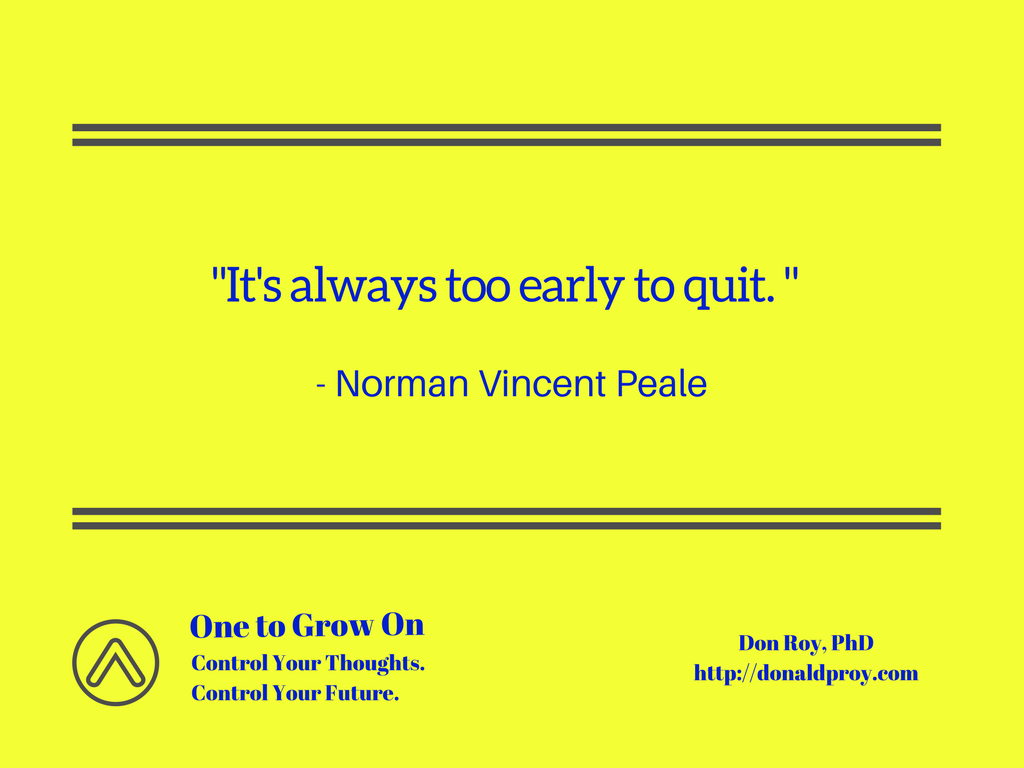Self-reflection can yield deep insight into what makes us tick. Sometimes, it is hard to get to truths about ourselves. It can be even harder to accept some of those truths. I found myself feeling this way as I considered the words of Norman Vincent Peale, the famous author, minister, and positive thinking advocate. Peale said, “It’s always too early to quit.” I realized I am what you might call an “aspiring quitter.” Sometimes, it seems like I can’t quit soon enough, the opposite of Dr. Peale’s encouragement. So, I reflected further on Peale’s exhortation to not quit.
The flight-or-fight dilemma that involves the decision whether to quit is one that is faced daily. The morning run is too tiring; I should slow my pace or even walk. The manuscript revision is too daunting; how can it be reworded to improve its quality? The business opportunity is too risky; failure could lead to embarrassment and even financial hardship.
Quitting could be a solution to these and other challenges we face. It could also keep us stuck right where we are. So, what forces tempt us to quit? They can be categorized as internal or external.
Voices Inside Your Head
You can usually look into the mirror to find the greatest obstacle to overcoming the urge to quit. We do not set out to sabotage our own growth, but we manage to do it. Leading the list of reasons we face internal pressure to quit are self-limiting beliefs. We buy into arguments about we can and cannot accomplish. Check out some of these beliefs to see if they sound familiar:
- “I’m no good at public speaking”
- “I am not a leader”
- “I don’t have the connections needed to get ahead.”
I could go on with the list, but that’s not the point here. We can choose to believe whatever we tell ourselves about our capabilities. Those statements can be positive or negative; we get to author their content and tone. Interestingly, we often opt to tell ourselves negative things.
Well-Meaning Others (Sometimes)
Even when we convince the person in the mirror not quit on an idea or project, we may still face skepticism from others around us. Someone told me just today about a relative who was discouraging her son from pursuing a medical degree in college because “he wouldn’t be able to cut it” (thanks for the support, Mom). I have heard many stories of people with influence over others discouraging them like this mother is trying to talk her son out of studying medicine.
Well-meaning family and friends have been known to advise against moving away for a job, going to graduate school, or committing to a long-term relationship. Sometimes, their advice is rooted in the best of intentions. Other times, their position is based on lack of confidence in you or even jealousy that you might be happy if you move on. Other people can lead us to doubt ourselves regardless of whether the advice is legitimate or self-serving. Quitting is a response that prevents us from going too far out on a limb. And, it might even be pleasing to others who want us to quit (i.e., not get ahead).
What’s the Alternative?
This week and going forward, I am going to take Norman Vincent Peale’s advice to heart. It is always too soon to quit. Whenever I am tempted to consider quitting something, I will consider alternative responses. For example, when I want to quit running, I will think of a time I wanted to quit but found the strength to keep on. I will recall the euphoria of reaching deep down to complete a run and how I would like to experience that feeling again. Asking questions about how to deal with the self-doubt that is quitting can be a distraction if nothing else. We shift focus from quitting to the benefits of keeping on. The long-term goal is to remove “quit” from the vocabulary. There are options to quitting; they must be pursued.
What ideas, projects, or goals are you tempted to quit? What alternative ways of thinking about quitting can you employ to have a mindset that it is always too early to quit?


